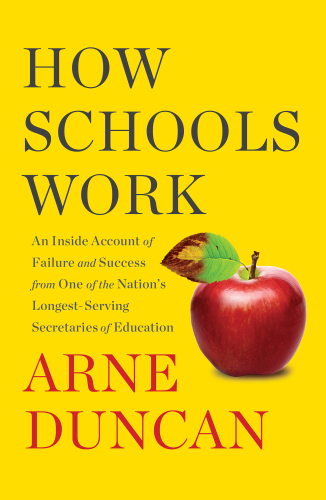
How Schools Work
An Inside Account of Failure and Success from One of the Nation's Longest-Serving Secretaries of Education
کتاب های مرتبط
- اطلاعات
- نقد و بررسی
- دیدگاه کاربران
نقد و بررسی

March 15, 2018
Duncan has been involved in education for three decades, from his mother's after-school program on Chicago's South Side to his position as Secretary of Education under President Barack Obama. He's been called racist from the Left and autocratic from the Right, so expect to be provoked.
Copyright 2018 Library Journal, LLC Used with permission.

July 1, 2018
The former Secretary of Education makes an impassioned plea for school reform.Don't let the blandness of the title fool you. The first chapter is titled "Lies, Lies Everywhere," and its first sentence is "Education runs on lies." So who is doing the lying? According to Duncan, pretty much everyone involved with setting and maintaining educational standards or representing teachers or overseeing the buildings or using the issue of education as a political football. "The truth is that we not only don't value our teachers," he writes, after suggesting that teachers unions resist educational reform. "It's that we don't value our kids." It's hard to argue against schools putting kids first, though many of the policies advanced by the author when he was in the cabinet of his fellow Chicagoan, Barack Obama, proved far more contentious. Their program was called Race to the Top, and "it challenged some sacred cows of the left: namely, that the teachers' unions were loath to cede any power when it came to deciding how to pay, train or evaluate teachers." It also placed a premium on data for assessment and accountability, though the author's conversational tone here stresses classroom interaction rather than numbers. He also insists that the emphasis on standardized testing and Common Core standards has been misunderstood, partly because of some communication failures. Education was plainly an Obama priority, and the numbers under Duncan were often impressive, as performance rose and dropouts decreased. Yet there was contention from the left, from unions that are generally considered a Democratic stronghold, and from the right, where Obama faced tea party resistance on practically every front. Those who play politics with education are missing the big picture, he writes: "This is not about test scores, knowledge, or even school. It's about life."Duncan's heart is in the right place--he's for kids and against lies--but the specifics of his analysis remain open to debate.
COPYRIGHT(2018) Kirkus Reviews, ALL RIGHTS RESERVED.

August 13, 2018
In this heartfelt memoir and explainer, former secretary of education Arne Duncan recounts his life in education and lays out his ideas about where schools have gone wrong and what they should look like. The book begins with an anecdote from Duncan’s early work as a volunteer tutor in his South Side Chicago neighborhood, where he quickly realized that high school students excelling on paper were not remotely prepared to enter college. The narrative progresses chronologically through Duncan’s experiences as the CEO of Chicago Public Schools and his eventual work as secretary of education during Obama’s presidency. As CEO of CPS, Duncan worked with Steven D. Levitt, a statistician and professor from the University of Chicago, to determine which students were falling behind, which teachers were lying about their students’ progress to protect their own jobs, and why CPS was failing to prepare its students for life after graduation. He highlights his work as secretary of education, where he focused on unearthing the personal stories underlying the large-scale numbers used to measure the health of the American educational system. He passionately argues that the student, the only person in education systems not getting paid yet the one at risk of losing everything, must come first. Duncan’s experienced perspective will interest anyone invested in American public education. Agent: David Larabell, CAA.

























دیدگاه کاربران